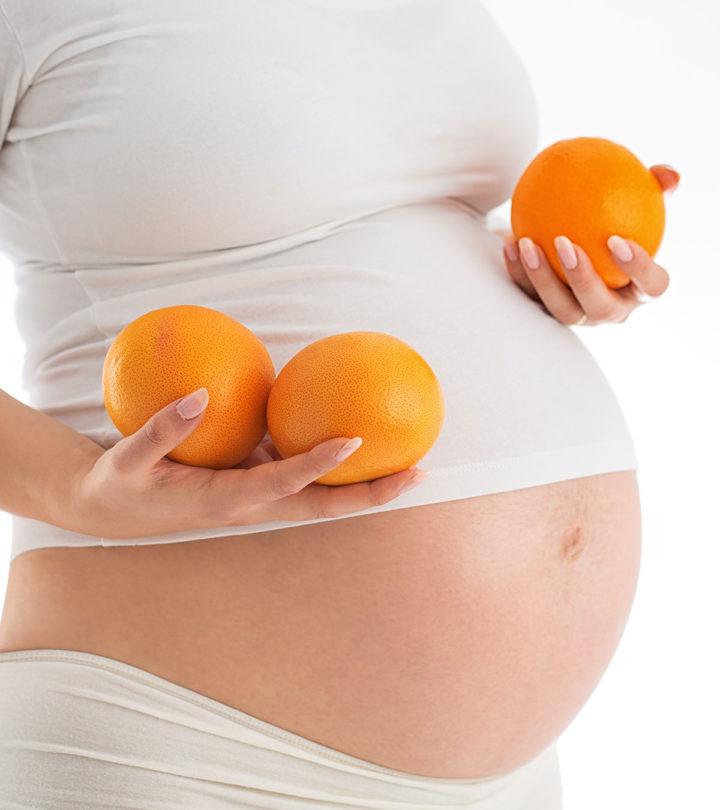Vitamin C During Ivf

Image: Shutterstock
Vitamin C is a water-soluble nutrient which your body cannot store. Therefore, you require a fresh supply every day during your pregnancy to improve fetal growth and development. Moreover, it helps you stay healthy as it is the immune system's best friend. The right amount of vitamin C is safe for a healthy pregnancy, but it is wise not to have it in mega-doses. MomJunction helps you understand why vitamin C is important during pregnancy, how much to take, its risk factors, deficiency and more.
How Much Vitamin C Do You Require During Pregnancy?
The recommended daily amount (RDA) is 85 milligrams (mg) for pregnant women who are 19 years and above; and 80mg for women of 18 and below.
As per the US Food and Nutrition Board of the Insititute of Medicine and National Academy of Sciences, the tolerable upper intake level (UI) is 2,000mg per day for women of 19 and above; and 1,800mg for women 18 and below (1).
[ Read: Oranges During Pregnancy ]
Why Do You Need Vitamin C When You Are Pregnant?
During pregnancy, it is necessary to have vitamin C (also referred as ascorbic acid) in right amounts in the body. It is essential for the:
- health of the expectant mother
- development of the fetus
- removal of any cosmetic defects in the mother and baby
- The antioxidant property of vitamin C fights infections and protects your body from toxins and any damage (2).
- It helps in tissue repair, wound healing, bone growth and repair and having healthy skin (3).
- It is vital in making collagen, a structural protein which is a component of cartilage, bones, tendons and skin (4).
- It helps the body absorb iron from food (mostly vegetarian sources). Iron keeps hemoglobin levels normal and protects you from anemia. Iron rich food along with a glass of orange juice aids better absorption (5) of the mineral. Vitamin C increases the absorption of iron from the intestines. Iron requirements increase in the second and third trimester and thus supplementing vitamin C in your diet will help to fulfill the requirements.
- Vitamin C prevents bleeding gums, thus reducing subcutaneous hemorrhages (6).
- Vitamin C helps you deal with varicose veins as it arrests cholesterol buildup and removes any toxic substances (7).
- Ascorbic acid aids in the proper development of the fetus. It helps in the formation of baby's tissues, strengthens the blood vessels of the placenta, thereby providing more oxygen to the fetus, and lowers the risk of placental abruption (8).Placental abruption is prevented by vitamin C by improving adhesiveness of the placenta.
- It is also an excellent remedy for constipation and is useful for easy bowel movements (9).
- It improves the skin's elasticity, therefore lessening the stretch marks, and they disappear post pregnancy (10).
- According to the book 100 Best Foods For Pregnancy, Vitamin C benefits nails and hair of both the mother and fetus.
- Vitamin C maintains intravascular pressure, and thus helps in maintaining hydration.
[ Read : Sweet Potato During Pregnancy ]
Food Sources Of Vitamin C
The primary sources of vitamin C are citrus fruits, but even leafy greens and several fruits and vegetables contain this vitamin. Fresh foods are the best sources as heat can destroy the vitamin. Cereals and juices are also fortified with this vitamin.
Vitamin C foods can be divided into various categories:
Fruits – It is found in citrus fruits like orange, lemon, and tangerine and also in apples, apricots, persimmons, peaches and berries such as strawberries, sea buckthorn and blackcurrant. They can be taken fresh or also in the juice or compote forms.
Vegetables – Tomato, beets, pepper, fresh potatoes are good sources. Cabbage, especially in fermented form, is a high vitamin C source.
Green leaves – Parsley and sorrel are excellent sources.
Animal sources – Both meat and fish have enough amount of ascorbic acid to help meet your daily requirement.
Briar (thorny bush) – It can be brewed and taken in tea form. It tastes good when mixed with honey.
Listed below are some of the best sources of vitamin C and the quantity:
- 6oz orange juice – 62 to 93mg
- 6oz grapefruit juice – 62 to 70mg
- 1 kiwi – 91mg
- 1/2 cup sweet bell pepper (raw; chopped) – 95mg
- 1 medium sized orange – 70mg
- 1 cup whole strawberries – 85mg
- 1/2 medium sized grapefruit – 38mg
- 1/2 cup broccoli (cooked) – 51mg
- 1 medium sized tomato – 16mg
- 1 medium sized potato (baked) – 17mg
- 1 cup spinach (raw) – 8mg
- 1 cup kale or collards – 70mg
- 1 cup broccoli or cauliflower – 45mg
- 1 cup Brussels sprouts (cooked) – 96mg
- 1 cup raspberries – 30mg
[ Read:Fruits To Eat During Pregnancy ]
Vitamin C Deficiency During Pregnancy
Deficiency of vitamin C will lead to major complications in both the mother and baby.
- Vitamin C deficiency prevents the fetus' brain from optimal development. According to a study conducted at the University of Copenhagen, pregnant women should make sure to include vitamin C in their diet from the beginning because taking it after the damage is done to the baby's brain will not help. The study has found that fetal brain damage could happen very early in the pregnancy.
- It will also cause bleeding gums, which disrupt the capillary veins (small blood vessels) beneath the skin. If this condition persists, it may cause scurvy.
- Deficiency in vitamin C can also cause rough and dry skin, and slow the healing of cuts, bruises and brittle hair.
[ Read:Bleeding Gums During Pregnancy ]
Do You Need Vitamin C Supplements During Pregnancy?
It is quite easy to get the daily requirement of vitamin C from foods. Therefore, most pregnant women do not need supplements. A glass of orange juice (especially calcium-fortified) during breakfast helps you get the required amount.
Research shows that vitamin C supplementation helps prevent premature rupture of choriomaniotic membranes (PROM) (11).
It is advisable to talk to your healthcare provider before taking any supplements containing vitamin C as they can risk premature labor.
Side Effects Of Excess Vitamin C
- The vitamin C intake should not exceed the recommended daily allowance, especially during pregnancy. It may lead to the following complications if taken in excess amounts.
- Continuous consumption of vitamin C above two grams every day can aggravate gout condition and develop kidney stones (12).
- Women who are highly dependent on a high dosage of vitamin C may show its deficiency symptoms when they abruptly stop taking vitamin C. It is advisable to cut down the amounts gradually.
- High doses of vitamin C will lead to abdominal cramps, nausea, fatigue, gut blockage, insomnia, headaches, diarrhea, hot flashes and rashes.
- Advanced side effects include inflammation of the esophagus, Parkinson's disease, red blood cell complications, discomfort at the injection site, thickened blood vessels around heart, skin irritation, problems of digestive tract and urinary tract complications.
- It may increase the risk of high blood pressure, and diabetic women will experience a spike in their blood sugar levels.
- A few reports say that intake of excessive vitamin C supplements prevents scurvy, a disorder associated with vitamin C deficiency (13). But again according to the American Pregnancy Association, too much of vitamin C taken when pregnant can cause newborn scurvy (baby will be born with vitamin C deficiency). When you take more, your kidneys will excrete the excess amount of vitamin C, thus causing resistance or intolerance to it in your baby.
Diuresis (increased production of urine) and excess fluid intake helps rule out some of the above conditions.
Frequently Asked Questions
1. Can you take vitamin C cough drops and cold medicine during pregnancy?
Doctors say that it is perfectly fine to take vitamin C cough drops (like HALLS Defense) or cold medicine during pregnancy. It is like supplementing your body with an essential nutrient, which your body and your newborn needs. You should avoid taking extra doses and check with your doctor before you start taking them.
2. Can vitamin C affect pregnancy tests?
Eating vitamin C rich foods or taking its supplements is not known to affect the home pregnancy test, which tests for the hCG hormone. It is a myth that mega doses could lead to miscarriage as it is not scientifically proven. Also, there is no evidence regarding vitamin C interference with hCG levels.
3. Does vitamin C cause abortion?
Excess intake of vitamin C can cause miscarriage, which instigates some women to use this vitamin for abortion. Some believe vitamin C stimulates menstrual cycle, thus resulting in a miscarriage. But no evidence shows its abortifacient nature.
4. Can I take Blackmores Vitamin C supplement during pregnancy?
Blackmores supplement combines the benefits of vitamin C, zinc and magnesium to support the immune system and general wellbeing. However, you should consult your doctor before taking it when you are pregnant.
5. How is Vitamin C and bioflavonoids related?
Both are potent antioxidants, which keep your eyes and body healthy. Citrus fruits and vegetables, rich in vitamin C, are also good sources of bioflavonoids. They have a complimentary effect and work efficiently together. Researchers believe that benefits accredited to vitamin C alone could actually be a combined effect of both vitamin C and bioflavonoids
6. Is it safe to take Lypo spheric or Celin vitamin C during pregnancy?
These vitamin C drugs contain nutrients essential for both the mother and baby. However, you should consult your healthcare provider before planning to take them.
7. Do vitamin C creams treat pregnancy mask?
Vitamin C creams are antioxidants and are safe in pregnancy when topically applied. Melasma, also known as pregnancy mask, is a common complaint among most of the pregnant women. Vitamin C creams and serum are the best treatment options.
Hope this article helps you in figuring out the benefits of vitamin C during pregnancy. If you know any more about this essential vitamin, do share in the comment section below.
Recommended Articles:
- 18 Vitamin E Rich Foods You Should Take During Pregnancy
- 9 Vitamin B12 Rich Foods You Should Take During Pregnancy
- 24 Vitamin B Rich Foods You Should Include In Your Diet During Pregnancy
The following two tabs change content below.
- Reviewer
- Author

Dr Ankita Gharge is an MD in Internal Medicine and has expertise in hypertension, diabetes, thyroid disorders, weight management and nutrition. She has several publications and papers to her credit. She believes in providing a positive approach to health and wellbeing of people.

Swati Patwal is a clinical nutritionist and toddler mom with over eight years of experience in diverse fields of nutrition. She started her career as a CSR project coordinator for a healthy eating and active lifestyle project catering to school children. Then she worked as a nutrition faculty and clinical nutrition coach in different organizations. Her interest in scientific writing... more
Source: https://www.momjunction.com/articles/heath-benefits-of-vitamin-c-during-pregnancy_0087534/







Tidak ada komentar:
Posting Komentar